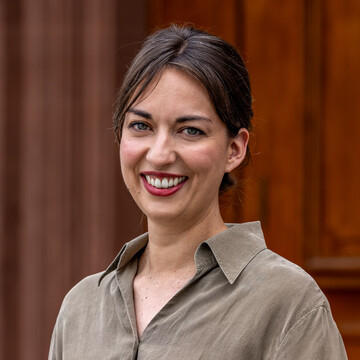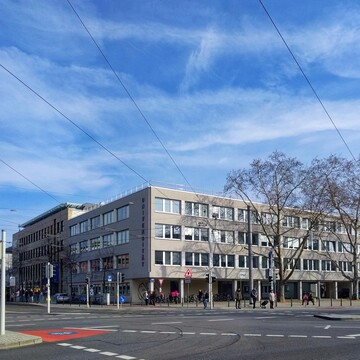Master's Program in History
Program facts and information
Degree: Master of Arts (M.A.)
Standard period of study: 4 semesters (2 years)
ECTS credits: approx. 120
Language of instruction: German
Language requirements: German (Click here for further information)
Program start: Fall semester (September) and spring semester (February)
Academic calendarSchool: School of Humanities
Semester fee: EUR 194 (more information)
Tuition fees for international students from non-EU countries: EUR 1,500
Tuition fees for a second degree: EUR 650Program overview
The research-oriented master's program in History is based on a bachelor’s program in the same field of study. The core content of the program is the application-oriented study of current theories and research approaches in history. Students have the opportunity to choose their own specializations in the fields ofAncient History, Medieval History, Modern Times, Contemporary History and Economic History. During their studies, they are closely involved in current research projects at the Department of History.
As part of a two-semester project work that is carried out in cooperation with museums, memorial sites, archives, publishing houses or media institutions, students will also expand their theoretical knowledge by gaining valuable practical experience in the communication of historical knowledge.
The elective module Interdisciplinary Diversification enables students enrolled in our master's program to broaden their horizon and take a look at areas outside their department, for example Sociology, Economic and Legal History, Economics, Media and Communication Studies or Political Science.
Why study History at the University of Mannheim?
The Department of History maintains numerous cooperations with cultural institutions and international universities, enabling our students to gain valuable practical experience during their studies.
Our teachers enjoy an excellent reputation both at national and international level. Due to individual advice provided by our subject-specific academic advisors, the program managers, and teachers as well as its academic profile, the Department of History stands out as an excellent institution for studying history in Germany.
The Humanities at the University of Mannheim have an excellent reputation in Germany (take a look at the rankings). With 450 partner universities, and students from 100 countries, Mannheim is one of the most international universities in the country, and provides students with an inspiring learning environment that facilitates excellent teaching and research.
Career opportunities
The master’s program in History is the perfect choice if you plan to continue your academic training with a doctoral program in order to pursue a career in science and research.
The skills acquired during your studies also open up a wide range of opportunities: our graduates work in the fields of history mediation (in editorial departments or museums), business consulting, history marketing, book trade and publishing or public relations.
Required interests and skills
Students of the master’s program in History should
- have a pronounced interest in historical research and the mediation of history,
- be able of critical and interdisciplinary thinking,
- have a high level of motivation and willingness to work independently and in a targeted manner.
Program structure
Module catalog
You can find further details on how the program is structured in the module catalog.Studying abroad
Master’s students can structure the program to suit their individual needs, which allows them to flexibly integrate a semester abroad into their studies. However, studying abroad is optional. The School of Humanities maintains international cooperation relationships with over 140 universities worldwide, and – in collaboration with the International Office – can help you plan a period of study abroad.Internships
Completing an internship during the master’s program in History is optional. The program of study includes a two-semester project module that is designed to impart practical skills. If you would like to do a voluntary internship, the school will be in the best position to assist you with the organization thanks to its first-rate connections.Continuing Education
Certificate programs
Strengthen your potential, deepen your knowledge, find solutions for challenges we will face tomorrow – there are many good reasons to think outside the box, get to know and try out new things even during your studies.At the University of Mannheim, you can do this in the “Studium Oecologicum” which focuses on sustainability. In our certificate program, you will acquire interdisciplinary expert knowledge which can help you to act ethically and to make holistic decisions.
Language courses
Making language learning easier: No matter if you want to learn Japanese, Hebrew, Spanish or Norwegian, take the Graduate Record Examination Test (GRE), The European Language Certificates (telc) or the TOEFL test – each semester, the University of Mannheim offers language courses and language certificates in more than 16 languages for students and non-university members, online and on campus!Studium Generale
Are you interested in IT or communication trainings or theater, music, or drawing courses? Studium Generale has a vast range of courses available to all.Doctorates
Successful graduates of the master’s program in History can pursue a doctorate at the School of Humanities. Please contact the program managers who will be happy to provide advice.
Doctoral programs and opportunities at the School of Humanities
General information on doctoral studies at the University of MannheimAdmission requirements and selection
In our selection process, we take numerous criteria into account. For more details, please check the selection statutes (see below). Be bold! Please do not hesitate to contact us if you need advice. We are looking forward to receiving your application!
Admission requirements
If you have not yet completed your bachelor’s degree, you may still apply for a master’s program as long as will provide a proof that you have obtained at least 135 ECTS credits.
- Completion of a bachelor’s program in History or a program recognized as equivalent, completed with a grade of “good” or better (equivalent to the German grade of 2.5) at a German higher education institution or abroad (also Berufsakademie) and corresponding to at least 180 ECTS credits or a standard period of study of at least three years
- Proof of proficiency in German
Selection criteria
The selection criteria are irrelevant since this program of study is currently not selective.Selection statutes
Under “Admission requirements and selection” we have compiled the most important selection criteria of the program for you. For more detailed explanations of the selection process and the legally binding requirements of the degree program, please refer to the selection statutes.Application
Scholarships and funding
The university offers various funding opportunities. Around 200 Mannheim students receive scholarships every year, which are intended to give them the freedom to focus on their academic achievements or to continue their voluntary work alongside their studies. Find out more about the funding opportunities and feel free to apply, for example, for the Deutschland Scholarship, the Opportunity Mannheim Scholarship or the Elite Sports Scholarship Rhine-Neckar Metropolitan Region.Funding opportunities for international degree-seeking students
Application deadline
The application deadline for fall semesters starts on 1 April and ends on 31 May.For the spring semesters the application is possible from 15 October until 15 November.
Contact

Aline Schmidt
School of Humanities
Schloss – Room EO 287
68161 Mannheim
Wed 10am-noon – online and in person consultation hours
Please book an appointment via https://www.phil.uni-mannheim.de/en/consultation-hours-masters-programs/
During the semester additional drop-in consultation hours in EO 287, Tue 10am–noon
Individual appointments via email.

Admissions Office
L 1, 1 – Room 157, 158
68161 Mannheim

